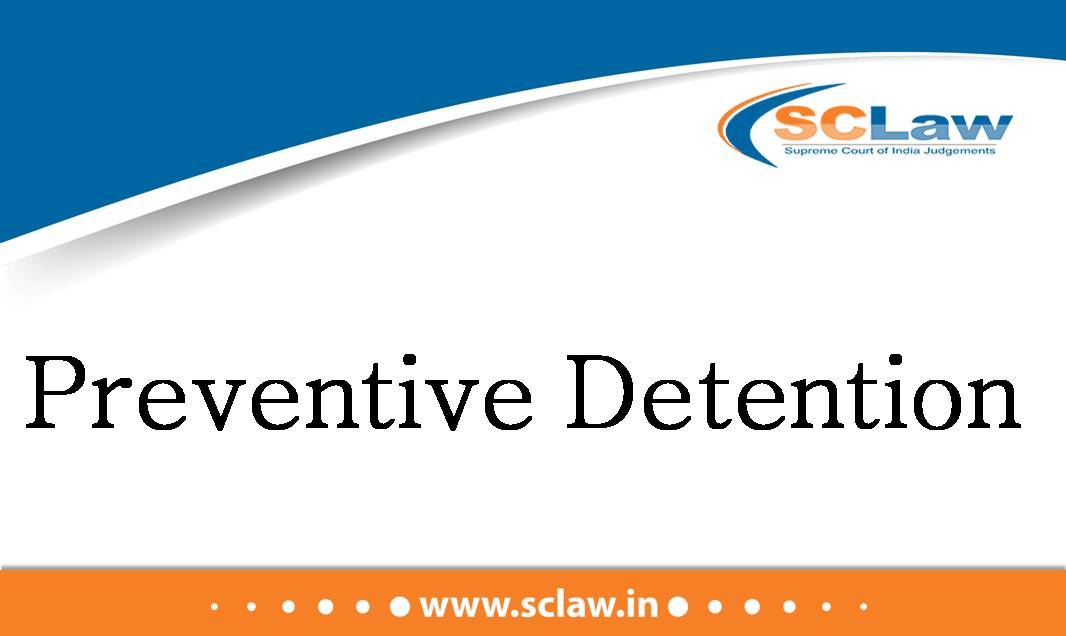Prevention of Illicit Traffic in Narcotic Drugs and Psychotropic Substances Act, 1988 – Section 3(1) – that the detenu had been released on bail by the Special Court despite the rigours of Section 37 of the NDPS Act, 1985, had not been brought to the notice of detaining authority – Detention order quashed – Appeal allowed.
SUPREME COURT OF INDIA FULL BENCH SUSHANTA KUMAR BANIK — Appellant Vs. STATE OF TRIPURA AND OTHERS — Respondent ( Before : Uday Umesh Lalit, CJI, S. Ravindra Bhat and…
Courts cannot interfere with the terms of the tender prescribed by the Government because it feels that some other terms in the tender would have been fair, wiser or logical.
SUPREME COURT OF INDIA DIVISON BENCH AIRPORT AUTHORITY OF INDIA — Appellant Vs. CENTRE FOR AVIATION POLICY, SAFETY & RESEARCH (CAPSR) AND OTHERS — Respondent ( Before : M.R. Shah…
Civil Procedure Code, 1908 (CPC) – Order 7 Rule 11 – Rejection of plaint – Respective suits are barred by the law of limitation, the respective plaints are required to be rejected in exercise of powers under Order 7 Rule 11 CPC.
SUPREME COURT OF INDIA DIVISON BENCH C.S. RAMASWAMY — Appellant Vs. V.K. SENTHIL AND OTHERS — Respondent ( Before : M.R. Shah and Krishna Murari, JJ. ) Civil Appeal No.…
(CrPC) – Section 482 – HELD there cannot be two investigating agencies with respect to the same FIRs/complaints arising out of the same incident/occurrence with respect to different co-accused
SUPREME COURT OF INDIA DIVISON BENCH NAVIKA KUMAR — Appellant Vs. UNION OF INDIA AND OTHERS — Respondent ( Before : M.R. Shah and Krishna Murari, JJ. ) Writ Petition…
In a case where it is found that the enquiry is not conducted properly and/or the same is in violation of the principles of natural justice, in that case, the Court cannot reinstate the employee as such and matter should be remanded to the Disciplinary Authority to conduct the enquiry from the stage it stood vitiated.
SUPREME COURT OF INDIA DIVISON BENCH THE INSPECTOR OF PANCHAYATS AND DISTRICT COLLECTOR, SALEM — Appellant Vs. S. ARICHANDRAN AND OTHERS — Respondent ( Before : M.R. Shah and Krishna…
Land Acquisition Act, 1894 – Section 30 – Dispute as to apportionment – Till the proceedings under Section 30 of the Act 1894 are terminated and/or disposed of the appellant cannot be permitted to withdraw the amount of compensation
SUPREME COURT OF INDIA DIVISON BENCH PATEL KODARBHAI MOHANBHAI — Appellant Vs. SONATA CERAMICA PVT. LTD. AND OTHERS — Respondent ( Before : M.R. Shah and Pamidighantam Sri Narasimha, JJ.…
Land Acqusition – HELD appropriate to deny the statutory benefits including interest on the enhanced amount of compensation from the date of the judgment/s and order/s passed by the High Court till the present appeals (special leave petitions) have been preferred before SCOI
SUPREME COURT OF INDIA DIVISON BENCH HARPAL SINGH AND ANR. ETC. ETC. — Appellant Vs. STATE OF PUNJAB ETC. ETC. — Respondent ( Before : M.R. Shah and Krishna Murari,…
Tribunal and the High Court have not committed any error in directing the Department to call for a review meeting of the Screening Committee to re-assess the suitability of the respondent for the purpose of grant of SAG and while doing so to exclude the ACR for the year 2007-2008.
SUPREME COURT OF INDIA DIVISON BENCH UNION OF INDIA AND OTHER — Appellant Vs. G.R. MEGHWAL — Respondent ( Before : M.R. Shah and B.V. Nagarathna, JJ. ) Civil Appeal…
Consumer – Insurance – Death in road accident – Insured shall be entitled to the amount insured under the policies for which the amount of premium was already paid prior to the death of the insured.
SUPREME COURT OF INDIA DIVISON BENCH SMT. SULAKSHNA — Appellant Vs. ORIENTAL INSURANCE CO. LTD. AND ANOTHER — Respondent ( Before : M.R. Shah and Krishna Murari, JJ. ) Civil…
(CPC) – Order 43 Rule 1 – Commercial Courts Act 2015 – 13 – An intra-court appeal under the Admiralty Act to the Commercial Division of the High Court would lie from any judgment, decree or final order under the Admiralty Act or an interim order under the Admiralty Act relatable to the orders specified in Order 43, Rule 1 and not from an order under Or 10 r 1 for addition of party.
SUPREME COURT OF INDIA DIVISON BENCH OWNERS AND PARTIES INTERESTED IN THE VESSEL M.V. POLARIS GALAXY — Appellant Vs. BANQUE CANTONALE DE GENEVE — Respondent ( Before : Indira Banerjee…













